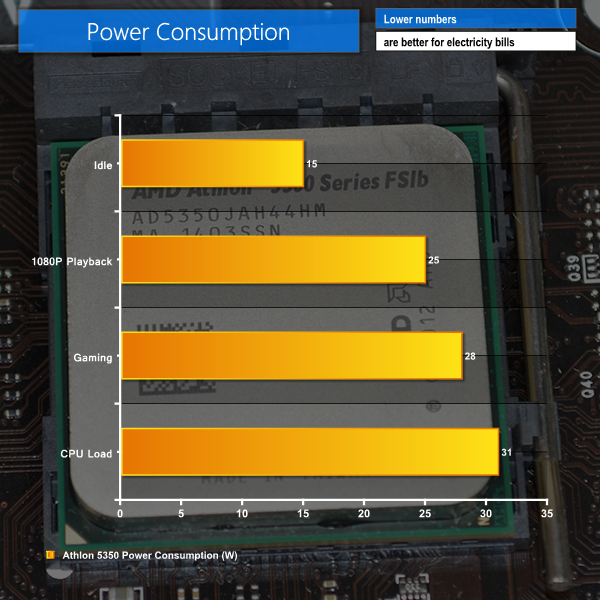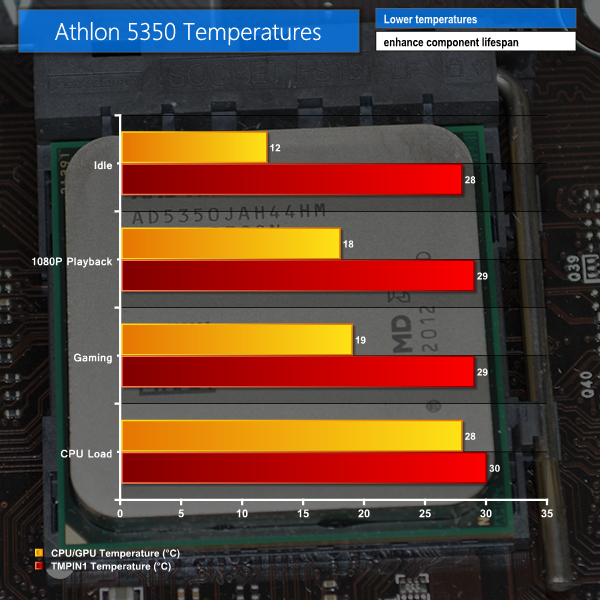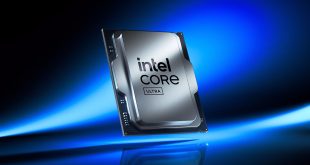We measured the idle temperatures and power consumption levels with the system resting at the Windows 7 desktop.
The temperature of the Kabini CPU cores and power consumption of our entire test system (at the wall) is measured while loading only the CPU using Prime95′s Small FFTs setting.
As a more accurate interpretation of real-world performance, we also record power consumption and temperature readings while running Bioshock Infinite for 10 minutes and during a 10-minute run of 1080P media.
Power Consumption
System-wide power consumption numbers for the AM1 platform are impressive. Idling at just 15W, our entire AM1 test system uses not much more power than a typical light bulb. The highest energy usage that we measured was 31W.
Power consumption numbers do not necessarily scale heavily with load, either. Going from 1080P media playback to a stretching gaming run only results in a 3W (12%) increase in power consumption.
Temperatures
Note: AMD's inaccurate GPU/CPU temperature sensors are clearly displaying incorrect readings. The temperature difference between each usage scenario is the only parameter that is worth considering.
Temperature recordings were taken on an open bench, not inside a chassis. Ambient temperature was a toasty 24°C which, in some ways, compensates for the open-air test environment.
As already pointed out, the CPU/GPU temperature readings are incorrect due to AMD's inaccurate sensors.
Assuming that the temperature sensors' error is constant (and not a function of the actual or recorded temperature), going from an idle state to 1080P playback increases the CPU/GPU temperature by 6°C. Full CPU load results in a 16°C temperature rise over the idle state.
Although sensor inaccuracies make the results difficult to interpret, AMD's Athlon 5350 does not seem to be a difficult chip to cool. I would wager that many small-sized passive solutions will cool the chip without resulting in any temperature-related issues.
 KitGuru KitGuru.net – Tech News | Hardware News | Hardware Reviews | IOS | Mobile | Gaming | Graphics Cards
KitGuru KitGuru.net – Tech News | Hardware News | Hardware Reviews | IOS | Mobile | Gaming | Graphics Cards





does the Single-Channel memory slow down add-on GPU cards as well ?
wonder how much slower the CPU will be with a older gDDR5 mid-rangeR7 card
I already got a R7 260x looking for a home for a 1.1/2 year till the upgrade
wonder if moving to a cheap FM2 is best ! ??
I am running this cpu with an AMD RX 480. Just for the lulz and while i wait for my Intel CPU.
Only register to say this: What in the hell was thinking the article maker, attacking that fake picture of the GPUZ ? I bought this piece of crap thinking the data was legit, just to find he take some random picture from internet from the hd 8400 card, and put that here. The real performance from the APU chip is 12,8 gb/sec, not 25,6.. You just ruin my build and make me to waste money (i already have a sempron 3850 who its GPU performs exactly the same. Damn internet, i dunno why i keep trusting jhon doe reviewers.
Correct the data with real gpuz info dude, before more people makes a mistake.
Man, did AMD screw up marketing this thing. “Rebranding” the socket from FSb1 to AM1 was a feat of search engine de-optimization. Marketing morons.